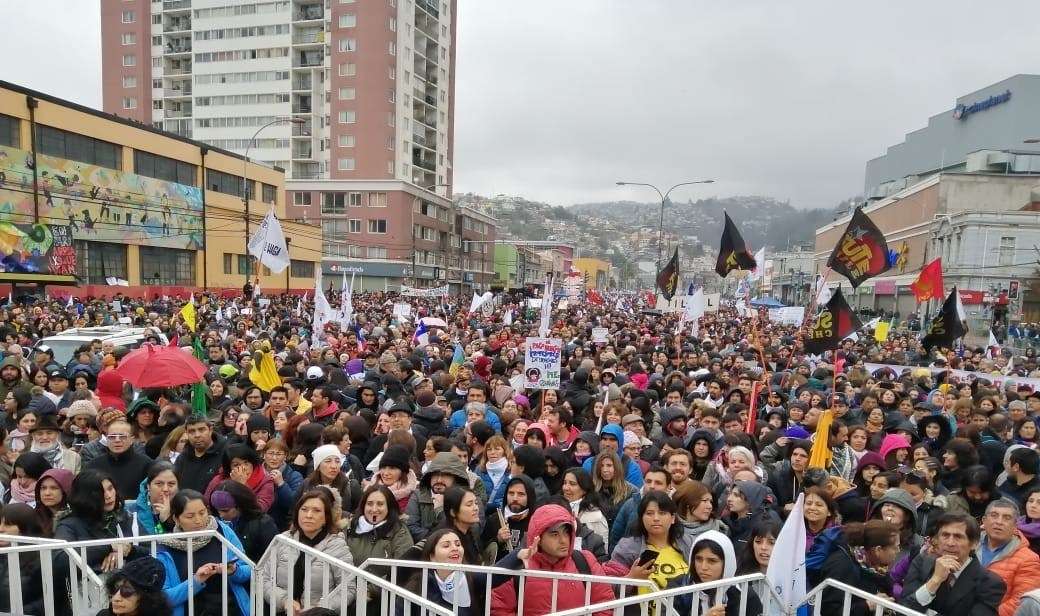By a commentator for Tjen Folket Media.
Thousands of teachers have taken to the streets in Chile. Local media reports a historic turnout.
Unlike in Norway, teachers have a very low status in Chile. The public schools receive few resources, and teachers earn very little and have long working hours. Conditions in popular schools are even worse and are characterized by lacking heating and maintenance. This is in stark contrast to the much better conditions in private schools, the norm for children of parents in richer classes.
In the daily struggle, teachers are often stand alongside the proletariat and peasants, indigenous people, students, and women. This is something they have in common with teachers in many oppressed nations in the third world.
Schools and universities often make for the strongest base areas for popular uprisings in Chile. Such uprisings have a constant presence. Large demonstrations happen weekly, and each year brings more large political struggles. Often these struggles demand better living conditions, better education, and concern class differences, political persecution, and the oppression of indigenous peoples.
This is another great interruption for schools in Chile. Each year, students occupy schools and universities and last year was a clear peak for these struggles. Several universities were closed for several months, with clear demands against patriarchal structures in schoolwork, sexual harassment and violence, and the rulers’ protection of these transgressions. Additionally, there have been general demands about education standards.
Authorities in Chile have since then introduced a new law for restraining the demonstrations in the schools. The law has been named «Peaceful Classroom», and gives police the right to break in and stop the entrance of all demonstrators. Children as young as 8 have allegedly been charged, frisked, and arrested. This, as well as the basis for the demonstrations, have stirred reactions among many, and as such the demonstrations also deal with protecting the peoples’ struggles.
The demonstrations began as early as April, but June saw increases in their strength. They have spread to many cities in the country and has become a national uprising. In videos and images from the demonstrations, one can see many students and youth marching and demonstrating alongside teachers. The images also show the police’s attempts to stop the demonstrations from escalating and demonstrators who defends the demonstrations and resist arrests and violence from the heavily armed riot police.
The Teachers’ Demands
As a basis for the demonstrations, teachers have released a letter explaining why they have taken to the streets. The most important points are:
- Poor working and environmental conditions in the schools, and a state that does not prioritize the maintenance of schools to acceptable levels. Several schools are infested with rats and have other damages, while most schools generally lack heating.
- Increased focus on national exams and pressures for good results. Children should be allowed to just be children, and the authorities are treating children like machines. Schools with higher scores receive more funding.
- Teachers have poor work contracts, long working hours, and many time-pressures, along with poor pensions.
- Newly introduced curricula has removed history, physical education, and art classes. Teachers maintain that these subjects are important and point out that the students must learn to address their feelings and become familiar with their identity and culture. They point out that Chile is among the countries that struggles the most with obesity in the world, and that it is wrong to not provide students time and education in physical training.
Kjære leser!
Tjen Folket Media trenger din støtte. Vi får selvsagt ingen pressestøtte eller noen hjelp fra rike kapitalister slik som rasistiske “alternative medier”. All vår støtte kommer fra våre lesere og fra den revolusjonære bevegelsen. Vi er dypt takknemlige for dette. Vi overlever ikke uten, og du kan gjøre ditt bidrag ved å støtte oss med det du kan avse.
